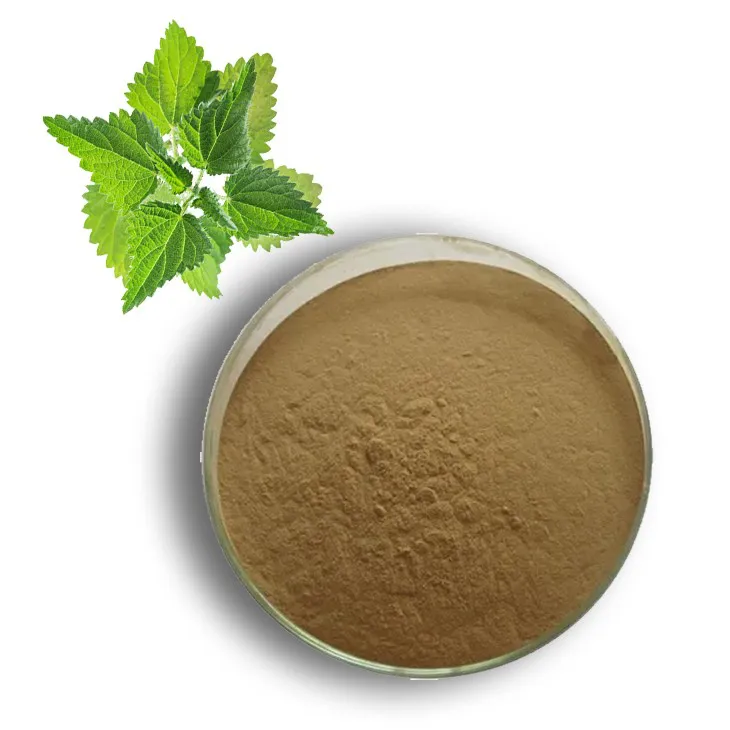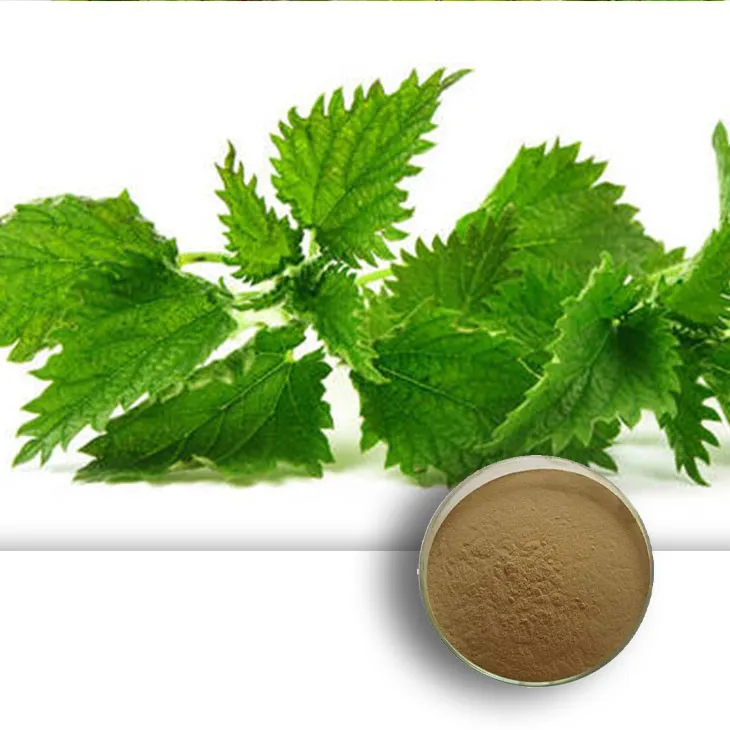- 0086-571-85302990
- sales@greenskybio.com
Does nettle leaf extract have benefits for diabetes? Are these all safe and applicable for diabetic patients?
2024-11-12

1. 引言
Diabetes is a chronic metabolic disorder that affects millions of people worldwide. As the search for alternative and complementary treatments continues, Nettle leaf extract has emerged as a potential candidate. This article aims to explore whether Nettle leaf extract has benefits for diabetes and assess its safety for diabetic patients by analyzing different viewpoints and evidence.

2. What is Nettle leaf extract?
Nettle leaf extract is derived from the leaves of the stinging nettle plant (Urtica dioica). It contains a variety of bioactive compounds such as flavonoids, phenolic acids, and polysaccharides. These components are believed to be responsible for its potential medicinal properties.

3. Potential Benefits for Diabetes
3.1. Blood Glucose Regulation
- Some studies suggest that nettle leaf extract may help in blood glucose regulation. Flavonoids present in the extract might enhance insulin sensitivity. Insulin is a crucial hormone in diabetes management as it helps cells to take up glucose from the blood. By improving insulin sensitivity, nettle leaf extract could potentially assist in better blood glucose control. - There is also evidence indicating that certain compounds in the extract may influence the activity of enzymes involved in carbohydrate metabolism. For example, it could inhibit enzymes that break down complex carbohydrates into simple sugars too quickly, thereby preventing rapid spikes in blood glucose levels.
3.2. Anti - inflammatory Effects
- Chronic inflammation is often associated with diabetes. Nettle leaf extract's anti - inflammatory properties could play a role in diabetes management. The phenolic acids in the extract are known for their anti - inflammatory action. - By reducing inflammation in the body, it may help to improve overall metabolic function. Inflammatory processes can interfere with insulin signaling and glucose metabolism. Therefore, the anti - inflammatory effects of nettle leaf extract might contribute to better glycemic control in diabetic patients.
3.3. Antioxidant Activity
- Nettle leaf extract is rich in antioxidants. These antioxidants can scavenge free radicals in the body. High levels of free radicals are often observed in diabetic patients due to oxidative stress. - Oxidative stress can damage cells, including pancreatic beta - cells that produce insulin. By reducing oxidative stress through its antioxidant activity, nettle leaf extract may protect pancreatic beta - cells and potentially improve insulin production and secretion, which is beneficial for diabetes management.

4. Safety Considerations
4.1. Allergic Reactions
- One of the main safety concerns regarding nettle leaf extract is the potential for allergic reactions. Some people may be allergic to the stinging nettle plant. Contact with the fresh plant can cause skin irritation, itching, and redness. - Although the extract is processed, there is still a risk of allergic reactions, especially in individuals with a known allergy to nettles. Allergic reactions can range from mild skin rashes to more severe anaphylactic shock in rare cases.
4.2. Interaction with Medications
- Diabetic patients often take multiple medications to manage their condition. Nettle leaf extract may interact with some of these medications. For example, it could potentially interact with blood - thinning medications as it may also have some anticoagulant properties. - There is also a possibility that it could interact with diabetes medications such as metformin or sulfonylureas. These interactions could either enhance or reduce the effectiveness of the medications, leading to unpredictable changes in blood glucose levels.
4.3. Dosage and Quality Control
- The appropriate dosage of nettle leaf extract for diabetic patients has not been well - established. Taking too much of the extract could lead to adverse effects. - Additionally, the quality of nettle leaf extract products on the market can vary widely. Poor quality products may contain contaminants or incorrect levels of active ingredients, which could pose risks to diabetic patients.
5. Different Viewpoints in the Research Community
5.1. Proponents' Viewpoints
- Some researchers believe that nettle leaf extract holds great promise for diabetes treatment. They point to the multiple potential benefits, such as blood glucose regulation, anti - inflammatory, and antioxidant effects, as evidence of its potential. - They also suggest that further research could lead to the development of nettle - based therapies that could be used in combination with existing diabetes treatments to improve patient outcomes.
5.2. Skeptics' Viewpoints
- Skeptics, on the other hand, argue that the current evidence for the benefits of nettle leaf extract in diabetes is not conclusive. They note that many of the studies conducted so far have been small - scale or in vitro (in test tubes) studies. - They also emphasize the safety concerns, especially the lack of clear dosage guidelines and the potential for interactions with medications. Skeptics believe that more comprehensive and large - scale clinical trials are needed before nettle leaf extract can be recommended for diabetes treatment.
6. Conclusion
- In conclusion, while nettle leaf extract shows some potential benefits for diabetes, such as blood glucose regulation, anti - inflammatory, and antioxidant effects, there are also significant safety concerns. Allergic reactions, potential interactions with medications, and issues related to dosage and quality control need to be carefully considered. - The current state of research is not sufficient to definitively recommend nettle leaf extract as a treatment for diabetes. More research, especially large - scale clinical trials, is needed to fully understand its effectiveness and safety in diabetic patients. Until then, diabetic patients should exercise caution when considering using nettle leaf extract and consult their healthcare providers before starting any new supplement.
FAQ:
Q1: What are the potential benefits of nettle leaf extract for diabetes?
Nettle leaf extract may have several potential benefits for diabetes. Some studies suggest that it could help with blood sugar regulation. Nettle contains compounds that might enhance insulin sensitivity, which is crucial for diabetics as it helps the body utilize glucose more effectively. Additionally, it may have antioxidant properties that can reduce oxidative stress, which is often elevated in diabetic patients and can contribute to various complications.
Q2: Is nettle leaf extract safe for all diabetic patients?
While nettle leaf extract may offer certain benefits, it is not necessarily safe for all diabetic patients. Some individuals may be allergic to nettle, which can cause allergic reactions ranging from mild skin rashes to more severe anaphylactic shock. Also, nettle can interact with certain medications that diabetic patients might be taking. For example, if a diabetic patient is on blood - thinning medications, nettle leaf extract, which also has mild blood - thinning properties, could potentially increase the risk of bleeding.
Q3: How does nettle leaf extract interact with diabetes medications?
Nettle leaf extract can interact with diabetes medications in different ways. As mentioned, if it has blood - thinning effects and a patient is on anticoagulant medications for diabetes - related reasons (such as to prevent cardiovascular complications), there could be an increased risk of bleeding. It may also interact with medications that affect blood sugar levels. For instance, if a diabetic patient is on insulin or oral hypoglycemic agents, nettle leaf extract might potentiate or interfere with the action of these drugs, either causing hypoglycemia (low blood sugar) or reducing the effectiveness of the medications.
Q4: What scientific evidence supports the benefits of nettle leaf extract for diabetes?
Some in - vitro and animal studies have shown promising results regarding the benefits of nettle leaf extract for diabetes. In vitro studies have demonstrated that certain compounds in nettle can stimulate insulin - secreting cells, suggesting a potential role in blood sugar regulation. Animal studies have also shown that nettle extract can improve glucose tolerance and lipid profiles in diabetic animals. However, more high - quality human clinical trials are needed to firmly establish these benefits in diabetic patients.
Q5: Are there any side effects of nettle leaf extract specifically related to diabetes?
Yes, there can be side effects related to diabetes. As mentioned before, the potential for interactions with diabetes medications is a significant concern. Hypoglycemia can be a serious side effect if the extract interferes with blood - sugar - lowering medications. Also, the diuretic effect of nettle leaf extract could potentially affect fluid and electrolyte balance in diabetic patients, especially those who already have compromised kidney function, which is not uncommon in diabetes.
Related literature
- The Potential of Nettle (Urtica dioica) in Diabetes Management: A Review of Current Evidence"
- "Nettle Leaf Extract: Effects on Metabolic Parameters in Diabetic Models"
- "Safety and Efficacy of Herbal Supplements, including Nettle, in Diabetic Patients: A Comprehensive Analysis"
- ▶ Hesperidin
- ▶ Citrus Bioflavonoids
- ▶ Plant Extract
- ▶ lycopene
- ▶ Diosmin
- ▶ Grape seed extract
- ▶ Sea buckthorn Juice Powder
- ▶ Fruit Juice Powder
- ▶ Hops Extract
- ▶ Artichoke Extract
- ▶ Mushroom extract
- ▶ Astaxanthin
- ▶ Green Tea Extract
- ▶ Curcumin
- ▶ Horse Chestnut Extract
- ▶ Other Product
- ▶ Boswellia Serrata Extract
- ▶ Resveratrol
- ▶ Marigold Extract
- ▶ Grape Leaf Extract
- ▶ New Product
- ▶ Aminolevulinic acid
- ▶ Cranberry Extract
- ▶ Red Yeast Rice
- ▶ Red Wine Extract
-
Curcumin
2024-11-12
-
Apricot Powder
2024-11-12
-
Pomegranate Extract
2024-11-12
-
Artichoke Leaf Extract
2024-11-12
-
Horse Chestnut Extract
2024-11-12
-
Berberis aristata Extract
2024-11-12
-
Dandelion Leaf Extract
2024-11-12
-
Dan Shen Root Extract/Salvia Root Extract
2024-11-12
-
Stevia Extract
2024-11-12
-
Rose Hip Extract
2024-11-12





















